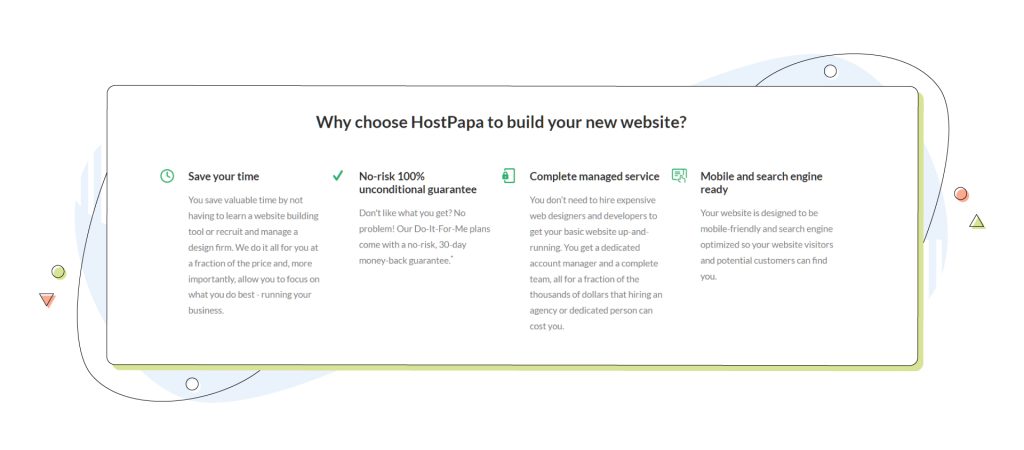These days, selling your own products is like living the dream. For some, it’s already happening. Others fear for all the paperwork that comes with it.
The reality is that there’s a substantial number of people who sell their own products online. In today’s digital age, it’s considered as easy as launching a simple website with your favourite Website Builder.
That said, starting your own eCommerce website might still seem neverending, and that’s why we’re here – to help you get a knowledge headstart on the eCommerce business you’re thinking about!
- What Is eCommerce?
- 1. Finding ‘The Strategy’: What Will Your eCommerce Business Be About?
- 2. Developing Your Business Model
- 3. The Anatomy of a Great eCommerce Website
- 4. A Look Into HostPapa’s Do-It-For-Me Website Service
- 5. The WordPress – WooCommerce Alternative
What Is eCommerce?
eCommerce, short for electronic commerce, is the process of buying and selling goods or services over the Internet.
An eCommerce business can sell products without needing physical storefronts or traditional brick-and-mortar establishments.

At its core, an eCommerce business needs four things to function properly:
- An online storefront: eCommerce typically involves the creation of an online storefront or digital platform where they’re able to showcase their products or services. These storefronts can range from simple websites to comprehensive online marketplaces, offering a diverse array of products from multiple sellers. A reliable web hosting service such as HostPapa’s VPS Hosting plans can easily handle any of those tasks.
- Digital payment system: In eCommerce, transactions are facilitated through digital payment methods such as credit cards, digital wallets, or online banking systems. These secure and convenient payment options enable customers to make purchases with confidence, eliminating the need for cash transactions. A secure payment system is built on top of a secure website using the latest technology and SSL certificates. Ensuring your web host supports the latest security tech ensures you’re on the right track.
- Logistics and fulfillment: When running an online business, it’s important to have a smooth and efficient process for handling orders and getting products to customers. This involves managing inventory, processing orders, and making sure everything gets shipped and delivered on time. By doing all of this well, businesses can keep their customers happy and build a strong reputation for reliability.
- Customers: All the above won’t have any effect if there isn’t any traffic flowing toward your website. Customers make a successful eCommerce business, and several factors such as search engine optimization, a fast web hosting provider and marketing can help by making the website more visible to potential customers.
Get your eCommerce website up and running hassle-free with HostPapa’s Do-It-For-Me service! Our expert web design team will create your site at a fraction of the cost of a traditional agency.
1. Finding ‘The Strategy’: What Will Your eCommerce Business Be About?
What do you want to bring to the market?
Market research is your compass in the landscape of online commerce. It’ll give you insights into consumer behaviour, industry trends, and potential competitors you might encounter.

Finding a Profitable Niche
Once you’ve grasped the broader market dynamics, the next step is honing in on a niche. A niche is a distinct segment of the market with specific needs and preferences.
For example, the market is filled with “vegan snacks,” but a niche product in that category would be “vegan snacks for fitness enthusiasts.”
Let’s explore a few more potential niches to illustrate this:
- Homemade scented candles: In a world that appreciates craftsmanship and uniqueness, handmade candles can carve a niche of their own. Think of scents, designs, and packaging that set your candles apart in the market.
- Custom tabletop games: With the surge in board game enthusiasts, a niche offering custom-designed tabletop games could tap into the personalization trend. Imagine creating games tailored to individual preferences or special occasions.
- A game of cards: Traditional card games, infused with a modern twist or unique theme, can attract a diverse audience. Consider the nostalgia factor and the potential for creative, engaging card game experiences.
- A puzzle with an interesting twist: Puzzles have a timeless appeal, but adding a unique element – perhaps a storyline, 3D design, or interactive component – can elevate your offerings in the market.
Perhaps you have a business set up by your family, and you want to unlock its online potential with a brand new website and social media accounts and build your reputation online, too.
Put Effort in the Business Name!
Have a brainstorming session with yourself or your colleagues and come up with a name that will be memorable and easy to write. This will, in turn, be the digital web address of your business.
After that, it’s a matter of minutes to secure your domain name from the domains page of your web host or at the checkout when opting for a web hosting solution such as Optimized WordPress or even Shared Hosting.
For example, HostPapa offers a free domain name on either of those services.
It’s Also About How You Sell
Your niche can be more than just what you offer. It can also include how you market or sell your product or service.
For example, two of the largest eCommerce companies in the world, AliExpress and Amazon, have significant differences in how they operate and market their products on their platforms.
Amazon is often recognized for its customer-centric approach and streamlined shopping experience. Based on machine learning, its recommendation system guides users towards relevant products faster. And with the Amazon Prime program, Amazon focuses on offering a fast and seamless checkout.
AliExpress, on the other hand, opens the door to thousands of unique products and sometimes more affordable products directly from international sellers. The big list of unique products makes AliExpress a good place to buy goods that aren’t readily available in certain countries.
We understand that each of the top eCommerce platforms has their own unique ways of positioning themselves in the marketplace. And that’s exactly what you need to do, regardless of what products you’ll be selling online.
Taking advantage of local SEO, for instance, can better position your eCommerce business into local customers.
2. Developing Your Business Model
Think about what you’re passionate about or really good at. Once you have your idea, it’s time to develop it further. You want to think about who your customers will be, what they’ll want, and how you can make your products or services special for them.

Perhaps you’re not interested in selling your own products, but instead, you’re considering dropshipping, where you act as an intermediary between the manufacturer and the end customer. It’s a very interesting idea that became popular during the COVID-19 pandemic. You don’t need stock or storage space, and you can work from anywhere.
A part of your business idea is thinking about how you’ll stand out from the competition. Maybe you’ll offer personalized customer service, eco-friendly products, or fast shipping. These simple things, as we mentioned about Amazon and AliExpress, will make your business grow steadily.
After figuring out your business plan, you’ll need to find out how you’ll get your products into your customers’ hands. This means figuring out your shipping strategy.
Think about how quickly you want your customers to receive their orders and how much you want to charge for shipping.
Some online stores offer free shipping as a special treat for customers, while others charge a small fee. You’ll need to decide what works best for your business and your customers.
Remember Your Personal And Business Finances
Keeping up with your personal and business finances means keeping track of your income, expenses, savings, investments, and debts.
It’s important to manage your finances well to achieve your financial goals, such as buying a house, saving for retirement, or growing your business. You can stay on top of your finances and make informed decisions by using reliable finance software, keeping a budget, regularly reviewing your financial statements, and seeking professional advice when necessary.
Remember, financial planning is a continuous process, so it’s never too late to start taking control of your finances.
3. The Anatomy of a Great eCommerce Website
After figuring out your niche, it’s time to get started with the actual website planning process.
Building a user-friendly website is paramount to a successful eCommerce business.

The user experience, from the moment a visitor lands on your site to the completion of a purchase, plays a pivotal role in shaping your brand’s image compared to other businesses.
What Does a Great Online Store Need?
Think of a great eCommerce website that goes beyond just selling products, like creating an immersive and seamless shopping experience for customers. All these elements are crucial for allowing your website to rank higher on search engines, and they apply to any website, including an eCommerce business.
Here are some key elements that contribute to a standout online store:
- Clear navigation: Customers should be able to find what they’re looking for easily. A well-organized menu and intuitive search function make navigation effortless. Cascading menus are very popular in eCommerce stores.
- Compelling product descriptions: Detailed and engaging product descriptions help customers make informed purchasing decisions. Include key information such as features, dimensions, materials, and benefits, as these are integral to your sales figures.
- High-quality images: Visuals also play a crucial role in online shopping. High-resolution images from multiple angles give customers a clear view of the product, helping to build trust and confidence.
- Customer reviews: Genuine customer reviews provide valuable social proof and build credibility. Encourage customers to leave feedback and showcase positive testimonials prominently.
- Secure checkout process: A secure and streamlined checkout process brings confidence in customers and reduces cart abandonment. Offer multiple payment gateways and ensure data encryption for transaction security.
- Mobile responsiveness: With more people shopping on mobile devices, a mobile-responsive design is essential. Your website should adapt seamlessly to different screen sizes for a consistent user experience.
- Personalization: Tailoring the shopping experience to individual preferences enhances customer satisfaction and loyalty. Implement features like recommended products, personalized recommendations, and targeted promotions.
- Fast loading speeds: Slow-loading pages frustrate customers and negatively impact conversion rates. Optimize your website’s performance to ensure fast loading times, especially on mobile devices.
- Easy returns and exchanges: A transparent and hassle-free return policy instills confidence in customers and reduces purchase anxiety. Clearly communicate your return and exchange process to promote trust.
- Customer support: Prompt and helpful customer support can significantly improve customer satisfaction. Offer multiple channels for assistance, such as live chat, email, and phone support.
Another great approach that ticks all the above boxes at once is HostPapa’s Do-It-For-Me service. This is created to help you decide which aligns best with your vision.
4. A Look Into HostPapa’s Do-It-For-Me Website Service
On the flip side, the DIFM option is tailored for those who prefer a more hands-off approach or lack the time to delve into the intricacies of website development.
With DIFM, a dedicated team of web designers takes charge of creating a professional, fully functional website according to your specifications.

How Does DIFM Work And What Are Its Benefits?
Do-It-For-Me enables you to have tons of different website options in a short time. From simple 5-page websites to complete eCommerce, the DIFM service offers everything in a single, convenient package.
More specifically, you get complete web development, copywriting, an optimized website for all devices, tons of free templates to choose from and hosting space for your site to live within. This mix leads to fantastic results and is the perfect start for new eCommerce business owners.
DIFM is a tiered service, so you can select the package that best suits your business needs. The DIFM plans are as follows:
- DIFM Basic: Up to a 5-page website with an image gallery, social media buttons, Google Maps integration, and a Call Us button.
- DIFM Standard: Up to a 50-page website – ideal for blogs, newsletters, and bigger businesses with lots of landing pages. It also comes with embedded widget support (weather, chatbox, music, news feed and more).
- DIFM Store: eCommerce support with up to 100 products, embedded product filters, product reviews, pre-order product support and ‘new product’ flags. It also includes a payment gateway processor, support for multiple currencies, payment methods and shipping options to cover every customer.
The latter is what’s interesting to focus on in this blog post. While the eCommerce cost is another factor to consider, DIFM keeps it very low to allow more people to enter the eCommerce realm easily and start selling online. For the Store version, you only need $199 per month with a $499 set-up fee.
5. The WordPress – WooCommerce Alternative
While website builders and DIFM (Do-It-For-Me) services offer simplicity and convenience, some entrepreneurs and designers prefer another approach.
HostPapa offers Optimized WordPress Hosting plans with the CMS pre-installed on fast web servers for anyone looking to try out this approach.

WordPress, with its ability to host plugins that extend its functionality, can become an eCommerce powerhouse with the right tools. Plugins like the open-source WooCommerce have a vast community that helps build enticing storefronts based on WordPress.
What Are the Advantages of WooCommerce?
One of the biggest advantages of WooCommerce is its flexibility. Designers can customize every aspect of the shopping experience, from product listings and checkout processes to shipping options and payment gateways.
This level of customization allows for creating unique and tailored eCommerce solutions that align with the brand’s vision and objectives. WooCommerce also has a big collection of free themes to choose from, so getting started with it takes little time.
Let’s check out a few more WooCommerce benefits and how they can help you create an online business:
- It’s flexible: You can tailor your eCommerce website to meet your needs and preferences. There can be multiple product variations to choose from or flexible shipping options for people living abroad.
- It’s full of customization: Enjoy complete control over the design and functionality of your online store. Start from a free theme and expand it with various options, or use supplementary plugins to help with the building process.
- It’s scalable: WooCommerce keeps track of your stock and supports plenty of categories and listing types to meet your niche’s requirements. One thing that makes WooCommerce highly scalable is the support for unlimited products.
- It comes with great customer support: Access to a vast community of developers, designers, and enthusiasts who can provide assistance and guidance anytime.
Final Words: Choose The Hosting That Best Suits Your Needs
More skilled business owners might find the WooCommerce option more alluring for their eCommerce store. WordPress is considered one of the best launchpads for any website, and WooCommerce is one of the most popular eCommerce plugins for the CMS.
With support for various digital products, online courses and services (think Craftsy, for example), WooCommerce is considered the holy grail for those who value flexibility, scalability and customization more over ease of use than other hosting options.
However, for less advanced users, HostPapa’s Do-It-For-Me or Website Builder hosting options are ideal and provide the perfect entry point for new eCommerce businesses to launch a profitable
Before taking the leap forward, we suggest evaluating your business model and taking small but firm steps to ensure that your online presence is where it should be.
At HostPapa, we aim to offer complete web services for any use case, so feel free to explore them!




